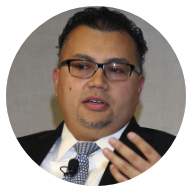Global credit funds & CLO's
March 2020
| Issue 221Published in London & New York.
Copyright Creditflux. All rights reserved. Check our Privacy Policy and our Terms of Use.
Opinion structured credit
Edwin Wilches

We can have a positive impact by bringing diverse thinking to our business
Portfolio manager
PGIM
March 2020 | Issue 221
Born:
Bogota, ColombiaLives:
20 miles west of New York City in New Jersey Education:
Rutgers University (economics and computer science) and New York University (MBA) Last holiday:
Disney WorldFavourite movie:
The Harry Potter series, which his daughters also love Fun fact:
Loves music, particularly Latin and hip hop, and has DJed at two weddings Bucket list:
Travel across Europe with wife and three daughtersCareer:
Wilches has been at PGIM for 17 years. He has worked in different parts of the firm’s business, but is perhaps best known as a CLO tranche investorPGIM:
One of the biggest investors in credit through its PGIM Fixed Income subsidiary. It invests across multiple parts of the market and, in addition to being a buyer of senior CLO tranches, manages $27 billion in CLO portfolios across US and Europe
PGIM's Edwin Wilches takes our credit quiz
Share this article:
Q.
Who is your inspiration? A.
My parents, who had no formal education, but set a very high bar. They worked hard and never took anything for granted. They have a strong moral compass and sacrificed themselves for the good of our family. Q.
What was your first job in credit? A.
I’ve been with PGIM’s fixed income team for 17 years and I’ve been fortunate enough to work alongside some of the sharpest investors, risk managers, credit research teams, economists and strategists in the business. When I started in 2003, PGIM Fixed Income had $151 billion in assets. It now has $851 billion. During my time at the firm I have worked on CLO tranche investing, structuring for PGIM’s Dryden deals and as a CDO analyst.
Q.
What is the best investment in credit?A.
Investing is especially challenging in today’s tenuous macro environment, given low and sometimes negative interest rates, and many assets near post-crisis tights in spread terms. Many assets have surpassed their fair value, but some still present very compelling risk-adjusted returns. In structured credit we believe the reach for yield and inability to obtain cheap repo, or financing for leverage, has created pockets of overvalued securities in CLO mezzanine and equity tranches. Thus, we currently view that investing in senior CLO tranches — effectively a leverage provider of last resort — is a very compelling risk-adjusted opportunity.
Q.
What’s been the best trade you ever made? A.
It’s tough to match any trade that was made during the financial crisis as assets were deeply mis-valued. There were CLO mezzanine tranches that we purchased in the single digits with no accrued interest that either paid principal and/or became current by paying accrued PIK and current interest due within a couple of months. A few quarters later as the global markets recovered these tranches were ultimately worth par. We believe it is likely that those opportunities will once again present themselves — although the underlying analysis of assets will be more critical this time around as we expect some mezzanine tranches to take losses in the next cycle. Q.
And the worst trade? A.
In general, it was buying less liquid credit after a sell-off. Better names and more liquid credit would have rallied more quickly. Q.
Where is the market heading? A.
In the near term, despite macroeconomic noise, default expectations are benign and global economic growth is expected to continue, despite potential blips from the coronavirus. Therefore, we expect spread products to continue to perform well. Longer term, although there isn’t an obvious or known catalyst, we are vigilant for a downturn, as pockets of credit deterioration continue and late cycle behaviour occurs. Unlike pre-crisis CLOs, we expect some mezzanine tranches to have impairments. Loan recoveries are likely to be worse and the amount of cumulative net losses in underlying portfolios will be greater during the next cycle.
Q.
What needs to change about the way your industry does business? A.
There are many possible areas of improvement in how CLOs trade in the secondary market. There’s also scope to create some standardisation in what is today a very heavily negotiated, bespoke documentation process in the primary market. However, in my opinion the greatest opportunity to improve our market is to focus on improving diversity across CLO managers, investors and service providers. Our industry isn’t always perceived as a preferred destination for the next generation of top talent. We have some work to do in helping current and future leaders understand the positive impact we can have for our clients and ultimately our firms by bringing diverse thinking to our business.
Prev article
Private credit is not overcrowded — there is four times as much private equity dry powder
Next article
Event










